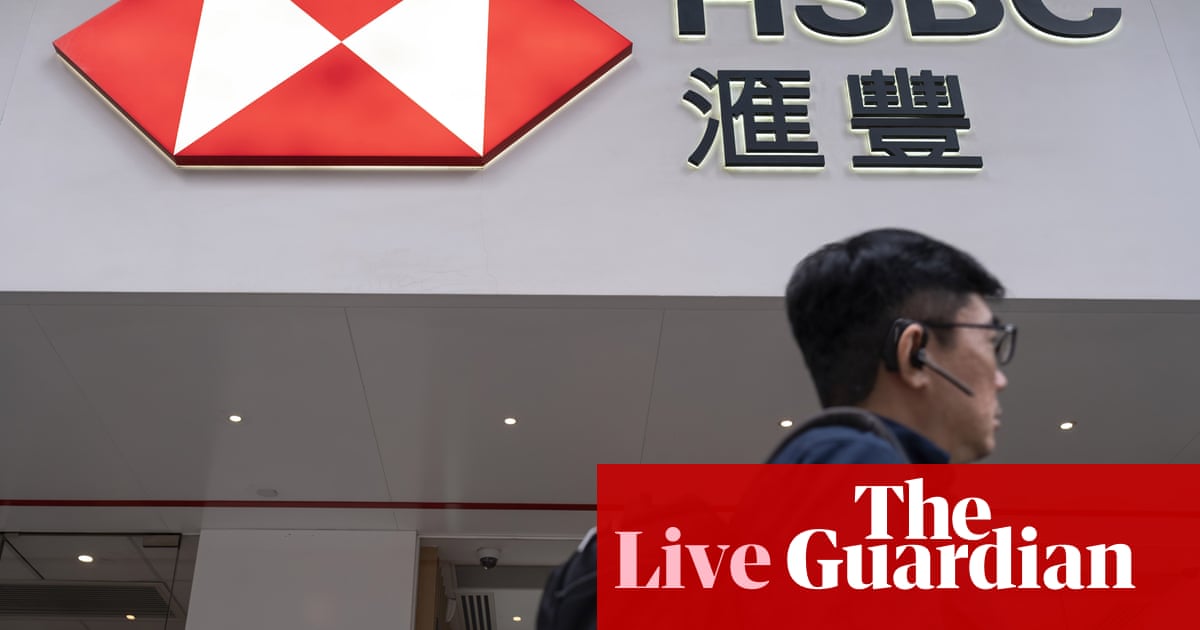Good morning, and welcome to our rolling coverage of business, the financial markets and the world economy.
Companies around the world are calculating the impact of Donald Trump’s trade war, and today we’re hearing from one of the world’s largest banks.
HSBChas set aside more money for bad debts this morning, warning that the economic outlook has deteriorated due to “geopolitical tensions and higher trade tariffs”.
HSBChas increased its expected credit losses (ECL) to $900m in the first quarter of 2025, which is $200m higher than in January-March 2024, as it lifted its provisions for debts going sour.
This helped to knockHSBC’sprofits for the quarter down by around a quarter, to $9.5bn, compared with 1Q 2024 (when the bank’s results were flattered by the sale of its businesses in Canada and Argentina).
HSBC also told shareholders that it had modelled scenarios in which tariffs are “significantly higher”, hurting growth – and found it would hurt its revenue and push up bad debt provisions by another $500m.
HSBCalso warns, in its latest financial results, that the US trade war has increased the risks facing the global economy.
It told shareholders:
There are already signs that this slowdown is occuring – the number of vessels scheduled to arrive at the Port of Los Angeles next week isdown by almost a thirdon the same period a year earlier.
8am BST: Kantar survey of UK grocery inflation
10am BST: UK Treasury Committee to question senior officials at the Prudential Regulation Authority
3pm BST: JOLTS report on US vacancies
3pm: US consumer confidence report
Amazon is seeking steep discounts from suppliers and setting tough terms to protect its margins amid the Trump trade war, the Financial Times reports this morning.
According to theFT,Amazonhad sought low double-digit price cuts from the sellers of goods ranging from homeware to consumer electronics, according to three vendor consultants — who negotiate on behalf of multiple brands and suppliers.
You can read the storyhere.
German airline Lufthansa is sticking with its forecasts for this year, despite the rising trade tensions and tougher US immigration processes under Donald Trump.
CEO ofLufthansa,Carsten Spohr,struck an upbeat tone this morning, telling investors:
There have been reports in recent weeks that tourism to the US has fallen due to a backlash against Trump, and high-profile deportations and detentions at the border.
Lufthansa,though, has seen an increase in transatlantic demand;Spohrsays:
Swedish appliances maker Electrolux is also counting the cost of the Trump trade war.
Electrolux, which makes white goods and household appliances, warned this morning that the demand outlook for home appliances is “increasingly uncertain”.
The company has lowered its North America market outlook for 2025 from “Neutral” to “Neutral to negative”, and cut its assessment of external factors from “Negative” to “Significantly negative”.
Summing up the last quarter,Electrolux’spresident and CEO,YannickFierling, says:
There are sounds of another handbrake turn from the White House in its trade war.
President Donald Trump is expected to soften the impact of his automotive tariffs, by tweaking them so that duties on foreign-made cars are not stacked on top of other tariffs, such as those on steel and aluminium.
Trump is also expected to ease some levies on foreign parts used to manufacture cars in the US.
The change was first reported by the Wall Street Journal, and now appears to have been confirmed by the administration.
Commerce SecretaryHowardLutnicksaid in a statement:
US treasury secretaryScottBessentis expected to speak to the US press pack later today at the White House daily briefing – perhaps this might be discussed….
Good morning, and welcome to our rolling coverage of business, the financial markets and the world economy.
Companies around the world are calculating the impact of Donald Trump’s trade war, and today we’re hearing from one of the world’s largest banks.
HSBChas set aside more money for bad debts this morning, warning that the economic outlook has deteriorated due to “geopolitical tensions and higher trade tariffs”.
HSBChas increased its expected credit losses (ECL) to $900m in the first quarter of 2025, which is $200m higher than in January-March 2024, as it lifted its provisions for debts going sour.
This helped to knockHSBC’sprofits for the quarter down by around a quarter, to $9.5bn, compared with 1Q 2024 (when the bank’s results were flattered by the sale of its businesses in Canada and Argentina).
HSBC also told shareholders that it had modelled scenarios in which tariffs are “significantly higher”, hurting growth – and found it would hurt its revenue and push up bad debt provisions by another $500m.
HSBCalso warns, in its latest financial results, that the US trade war has increased the risks facing the global economy.
It told shareholders:
There are already signs that this slowdown is occuring – the number of vessels scheduled to arrive at the Port of Los Angeles next week isdown by almost a thirdon the same period a year earlier.
8am BST: Kantar survey of UK grocery inflation
10am BST: UK Treasury Committee to question senior officials at the Prudential Regulation Authority
3pm BST: JOLTS report on US vacancies
3pm: US consumer confidence report
